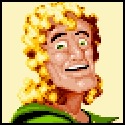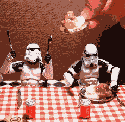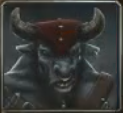|
I find itís more about method a lot of the time. Maths problems are the most similar things to working through programming problems. If you like doing (especially spatial) maths puzzles, a lot of programming a game will be enjoyable. If you hate it then game dev is probably going to suck. Thatís not to say there ISNíT a lot of math, but you can find resources to help through that. There arenít resources that will change the type of problems you like tackling.
|
|
|
|

|
| # ? Apr 18, 2024 02:04 |
|
My non-professional game development, but software development in general take is that you can get by with surprisingly little in the sense of math meaning numbers if you're fine making games that aren't really math intensive in the first place. Programming is an extremely "mathy" pursuit but it's more in the way that it makes you think than in that it's just numbers, numbers, numbers all the loving time. Part of the problem is that people think that grade school math is all that there is to mathematics when it's a weird mish-mash of useful tools for problems that come up in everyday life and these rules that are supposed to hint at a bigger structure. But the way math is taught in American schools the rules come off as almost like divine commandments and gives kids complexes about being "bad at math." There are many parts of programming which have formal mathematical models that underpin them that help explain how they "just work" while other choices don't. Sets in a language generally follow the expected behaviors of mathematical set theory, strings are free monoids over some character set while lists are free monoids over objects and relational databases are built on a part of mathematics called relational algebra. The more that you program, the more you're going to be exposed to those sorts of concepts and you'll get at least an intuitive grasp of what's going on. But yeah if you're writing a roguelike you can get by with enough math to know how to play D&D while if you want all sorts of super-realistic physics simulations done on a massive scale at real time, you're really not going to like that.
|
|
|
|
Thanks for all the replies. I can write code. I used to make BASIC programs on my Commodore 64, and i've done a little HTML in IT. But anything beyond basic mathematics, I was hoping that currently its all embedded in tools and scripts to do it for me, at least in a junior, entry level position. I have a problem with memory retention. I learn best on my own, teaching myself. That's what i've done for IT certifications, and my other interests. But i'm horrible when taking courses and learning from textbooks. I know that they are making new programs to teach people coding in creative and engaging ways. So if anyone knows a good one that applies to game development, let me know. I'd like to do development for porting games, and eliminating bugs. Quality control stuff. I'd like to do what Satoru Iwata was doing in the trenches, before he became the bigwig.
|
|
|
|
ChocNitty posted:Thanks for all the replies. I can write code. I used to make BASIC programs on my Commodore 64, and i've done a little HTML in IT. But anything beyond basic mathematics, I was hoping that currently its all embedded in tools and scripts to do it for me, at least in a junior, entry level position. I have a problem with memory retention. I learn best on my own, teaching myself. That's what i've done for IT certifications, and my other interests. But i'm horrible when taking courses and learning from textbooks. I know that they are making new programs to teach people coding in creative and engaging ways. So if anyone knows a good one that applies to game development, let me know. So like, you don't have to be able to do a matrix multiplication with pen and paper to be a good programmer, but you should (probably) understand what the effect of multiplying a matrix by an affine transformation matrix is, especially if you want to be doing the kind of low-level stuff it sounds like you're talking about. For what it's worth, I was loving awful at math in school but I find I'm actually pretty good at understanding the concepts when applied in programming. I lose concentration really easily when I'm e.g. factoring out a long equation, and that's just basic algebra, but more advanced stuff makes sense to me in the context of writing code. So I wouldn't write yourself off necessarily as "bad at math". Additionally, unlike at school, it's totally fine when you're programming to look stuff up and refresh yourself on the details of how things work. You don't have to memorize anything (I know I always need to give myself a quick refresher on things when I dig into them after a while), and hopefully after you've looked something up enough times you start to retain it. Breaking through the mental barriers of what you think you can or can't do is reallly important I think. djkillingspree fucked around with this message at 22:03 on Apr 12, 2020 |
|
|
|
Hello! I was pointed here to ask a technical question about Unity. I need to build a new PC, and I'm interested in getting started in Unity development. I was hoping to make something that would be good for working with without any serious issues, and I wasn't sure if I needed something beyond mid-range (like a $1000 build basically) to deal with, for example, unoptimized builds. I asked about this in the PC Building thread, and they said that as far as CPU/Graphics go there shouldn't be an issue, but the question of RAM was brought up, and they pointed me to this thread (directly, because I am bad at searching). I did a Google search and got kind of conflicting answers, so should I need anything beyond 16 gigs or is that plenty? The first proper game idea, as in not stuff being made to learn how to make what I actually want, could potentially need a lot of RAM in initial versions (basically it'd be a gigantic building the player would be smashing through walls, floors and ceilings to explore, and while there's probably plenty of memory tricks to drop resource requirements I'd probably leave that for after I do the design work to make the game fun first). Basically I don't know if Unity is a memory hog and if I should build for that. Thanks for any advice you might have!
|
|
|
|
HerniaFlange posted:Hello! I was pointed here to ask a technical question about Unity. I need to build a new PC, and I'm interested in getting started in Unity development. I was hoping to make something that would be good for working with without any serious issues, and I wasn't sure if I needed something beyond mid-range (like a $1000 build basically) to deal with, for example, unoptimized builds. I asked about this in the PC Building thread, and they said that as far as CPU/Graphics go there shouldn't be an issue, but the question of RAM was brought up, and they pointed me to this thread (directly, because I am bad at searching). I did a Google search and got kind of conflicting answers, so should I need anything beyond 16 gigs or is that plenty? The first proper game idea, as in not stuff being made to learn how to make what I actually want, could potentially need a lot of RAM in initial versions (basically it'd be a gigantic building the player would be smashing through walls, floors and ceilings to explore, and while there's probably plenty of memory tricks to drop resource requirements I'd probably leave that for after I do the design work to make the game fun first). Basically I don't know if Unity is a memory hog and if I should build for that. Thanks for any advice you might have! 16 should be fine for just about anything you'll do as an individual, and even most things at a larger org. My machine has 32, fwiw. E: I'm a programmer; no idea what all the art software requires if that's your bag.
|
|
|
|
As someone who started using Unity full-time last year (3D game, but not remotely bleeding-edge), I doubt you'll have trouble. I have a 12-year-old CPU (3.2GHz Core i7), 16GB of RAM, a 980ti graphics card, and if I wanted to improve my development life the #1 thing I'd do is replace my drive with an SSD. Like, yes your game is probably going to have bad performance, but you're not going to be playing your game much, especially early on. You're going to be writing code, making assets, waiting for stuff to compile, hitting the "run" button, waiting for all those assets to load, playing for five seconds, stopping, writing more code, etc. Of all those steps, the most annoying are "waiting for stuff to compile" (and link) and "waiting for all those assets to load", and I'm pretty confident that those (definitely the latter at least) are dominated by disk I/O. EDIT: vvv yeah, and you also pay a significant performance penalty for running your game inside the editor, especially if you're profiling. Performance in standalone builds will be much better. I managed to completely wedge my entire computer once while trying to deep profile the game through a mysterious 500MB allocation during program start. Couldn't bring up Task Manager, and every time the mouse moved the built-in speaker beeped. Weirdest thing I've ever seen my computer do. TooMuchAbstraction fucked around with this message at 22:40 on Apr 15, 2020 |
|
|
|
The Unity editor is a major memory hog, though. I had 16 gigs before and every now and then I would manage to run my computer entirely out of memory. I upgraded to 32 and it's been much more comfortable.
|
|
|
|
Yeah, that was the main concern, the development system is a memory hog. So basically it sounds like starting out I should be fine with just 16, but if I manage to get anywhere serious with it I should be looking to upgrade to at least 32. Someone also mentioned that if I wanted to run anything in tandem I'd need to consider more, but any asset work would probably be done outside of working on the game code itself so probably not. Okay, thank you for the help! Here's hoping the tutorials the tutorials for this are good, my brother seems to have some good ones lined up.
|
|
|
|
32GB isn't that expensive these days and then you have overhead for most any memory hog stuff like having 3 monitor's worth of windows and a virtual machine open. Higher than 32 is for if you need to render simulations which you probably won't be doing.
|
|
|
|
|
Flannelette posted:32GB isn't that expensive these days and then you have overhead for most any memory hog stuff like having 3 monitor's worth of windows and a virtual machine open. That's a good point, just testing stuff if it'll run correctly might get pretty involved. I'll go with 32 gigs then, already ordered 16 but from the looks of it I'm only really losing a few bucks buying 4 sticks of 8 instead of 2 sticks of 16, and if I somehow need to go higher I can use those for a smaller PC.
|
|
|
|
Got some questions about representation in games, and specifically how representation is perceived by game players. My impression is that we still seem to be largely mired in the "token representation" that's been the norm since the 80's at least -- where you have a bunch of default white male characters, then you have The Black Guy, The Asian Guy, The Girl, The One In A Wheelchair, etc. There's been a little progress in terms of representation of gays, and basically nothing when it comes to transgender characters. So first off: how accurate is that assessment? Second, assuming it is accurate, how much of that is companies perceiving this as the safest route to take to make a game that will sell? Is there much discussion about broadening representation and moving away from tokenism? What kinds of issues have to be considered when deciding on the background for a character, especially considering their role in the game? E.g. it being problematic these days to have your only female character exist to get captured/killed as a motivating ploy for the guys, or making your science character Asian. The reason I'm asking is because I'm giving some thought to the identities of the characters in my game. Frankly, gender and race shouldn't matter a whit to who they are; they're defined by their professional roles (captain, executive officer, commando, businessman, etc.). Historically, they'd all be male, and almost all white, but I'm not paying a whole lot of attention to historicity (edit: the main cast is all American storywise, but fortunately that leaves plenty of room for different ethnicities, recent immigrants, etc.). I'm really tempted to have no white men in the cast whatsoever, and basically have a cast comprised entirely of "tokens". Being a white man myself however, I'm leery of making mis-steps; I'm sure I have plenty of blind spots due to my background. And even assuming I did a good job of it, I have no idea how this would be perceived by the market. tl;dr babby's first guide to representation in games? TooMuchAbstraction fucked around with this message at 22:51 on Apr 18, 2020 |
|
|
|
Theres actually an entire thread in the great race space subforum that might be a good place to also post this request. Something to consider is how alien the movies script was made. Write your plot and story as gender and race neutral, then randomly assign those qualities to your cast.
|
|
|
|
I assume that "great race space" is the subforum currently known as "Minority Rapport"? I have trouble keeping tabs on all the subforums, and mostly stick to the creative/historical threads so I haven't been in D&D in...ever. Is this the thread you were talking about? If not, please link it, thank you! EDIT: oh, you probably meant this thread. TooMuchAbstraction fucked around with this message at 04:52 on Apr 19, 2020 |
|
|
|
TooMuchAbstraction posted:I assume that "great race space" is the subforum currently known as "Minority Rapport"? I have trouble keeping tabs on all the subforums, and mostly stick to the creative/historical threads so I haven't been in D&D in...ever. Yep, you found it. Sorry, I forgot its name updated.
|
|
|
|
I donít know how many people share my opinion, but I think the writing in 99% of games are trash. Even most games that people say has really good writing like Halo, I could have disabled the dialogue and enjoyed the game no less. The writing is almost always cliche, and bland, instead of being inspired and thought provoking. But thats okay with me for most genres of games, because I enjoy them to be immersed in the games world, and to be engaged by the gameplay, being challenged by puzzles, and hooked in with item collecting, and to enjoy other things like the score, and visual style, etc. Wouldnít it be a good idea of game producers and publishers contracted acclaimed authors from outside the gaming industry to write some of these games? Or do this more often? The reason Witcher 3 has an outstanding story and writing is because it came directly from an excellent novel. Or is it just a matter of cost? They donít have the budget to hire Steven King to write the next Telltale game.
|
|
|
|
This is a bit of a can of worms. Video games and novels are separate mediums, and writing for one is a whole different ball game from the other. Novels are all about sentence structure, wording descriptions in a way to transform otherwise dry content into scenes that will grab the reader. Video games, on the other hand, are a relatively new format that ideally involve weaving story and gameplay together to form a larger, cohesive whole. They involve a knowledge on the writerís part of how the story will interact with the rest of the game, with issues like pacing and formatting being deceptively different from books. Not only that, by virtue of the sheer amount of parts and people involved in making the average video game, writers are only a small part of the whole, as compared to being sole creator of a novel (usually; not counting editors and so on who come in later). Managing a team to coordinate story and gameplay efficiently and effectively is a difficult enough hurdle that most studios donít want to bother, and many that try, fail. For many subgenres, it's simply not worthwhile. As time goes on and standards for video game storytelling improve, weíll almost certainly see more great video game writers crop up, such as Amy Hennig, Shu Takumi, and Tim Schafer. Itíll likely not be the same folks that have already made a living off of novels, though, due to the sheer amount of differences in work style and skill set.
|
|
|
|
1337JiveTurkey posted:Speaking of deployment whatís the most warnings youíve ever ignored pushing to prod? "If you push that to prod, you'll be unemployed tomorrow."
|
|
|
|
MissMarple posted:I find itís more about method a lot of the time. Maths problems are the most similar things to working through programming problems. If you like doing (especially spatial) maths puzzles, a lot of programming a game will be enjoyable. If you hate it then game dev is probably going to suck. I would argue that a perverse satisfaction in problem solving is of more benefit than actual maths experience. I'm pretty terrible at maths, I'm really, really good at taking incredibly complex problems and making them my bitch. This week I turned a 45 minute installation into a 3 minute job by solving some horrifically complex logic problems. I also totally failed to teach my son some basic decimals since schools are closed and I'm poo poo at that.
|
|
|
|
Have another graphics question which sometimes people here can help answer: Does anyone know how a ribbon/trail particle works? I know how to make them in most engines with fully featured particle tools (you click the tick box that says ribbon and you're done) but I don't know how to make one without a pre-built toolset. To clarify I'm talking about things that can put long trails behind a bullet or something that aren't made of a stream of little particles but are instead a single graphic that stretches or tiles out from the back of the emitter as it moves and if the emitter changes course enough it is stopped and stitched onto the next segment of it as the emitter continues moving. I have seen them used in PS1 games so they aren't exactly new. For example you might want a cigarette with smoke that follows it in a long string as it moves and isn't made of individual puffs that are too far apart if it suddenly moves quickly. I was having trouble visualizing in code how to have the graphic be "fed" out in a string behind a moving emitter and then change direction to follow it.
|
|
|
|
|
Flannelette posted:Have another graphics question which sometimes people here can help answer: If you want to do it programmatically look up triangle strips. You need to procedurally build a mesh out of vertices and triangles which may or may not be camera-facing depending on the case. You don't need to move the triangles themselves to get the smoke flowing since you can animate the UVs. I'd guess during the PS1 era they mostly were pre-built meshes instead of particle systems which is still a valid but more limited approach. If you just need a smoking cigarette and not much more with the technique I'd do it the simpler way: include the modeled strip as part of the cigarette mesh, and maybe add a bone or two there so you can animate some wobble and stretching on the smoke, and then move the smoke trail UVs in shader.
|
|
|
|
Particles are basically just textured quads with some rules on how the quad transforms. Ribbon trails connect the particles together with more textured quads arranged as a, well, ribbon. If you want the ribbon without the particles, disable the particle renderer and leave the trail renderer enabled. (these kinds of specific "how do I do X" questions should probably be in the Game Development Megathread or the Making Games Megathread; my reading is that this thread is more for demystifying the game development industry)
|
|
|
|
ChocNitty posted:I donít know how many people share my opinion, but I think the writing in 99% of games are trash. Even most games that people say has really good writing like Halo, I could have disabled the dialogue and enjoyed the game no less. The writing is almost always cliche, and bland, instead of being inspired and thought provoking. Mostly the reason comes down to game production. 3 maybe 4 years depending on the game you write the story and story bible. The story is broken down into environments and levels. Then production starts. "Hey, um so for level 6 it turns out we're having problems with the occlusion and the number of enemies we want to make that indoors." "But we already recorded all the dialog talking about the forest!" "Ok well we'll have to cut that." "Hey we need an E3 demo so the time we were going to spend doing level 12 is being reallocated, so we're cutting level 12." "But that's where story beat Z happens!" "Make it work." etc... I worked on a shooter about 10-15 years back that lost 3 of it's levels and a full environment during production. All of it after the story was written and the dialog was recorded. We had to piece together a story after the fact some of it just being choppy voice over at the start of a level load.
|
|
|
|
ChocNitty posted:I don’t know how many people share my opinion, but I think the writing in 99% of games are trash. Even most games that people say has really good writing like Halo, I could have disabled the dialogue and enjoyed the game no less. The writing is almost always cliche, and bland, instead of being inspired and thought provoking. That's why a lot of game writing is kinda lazy and disconnected from actual gameplay, because writing against actual mechanics is hard and as Hughlander points out it can also be constraining as development goes on. "Acceptable" writing in games more or less just sets a backdrop for the game to take place against, like Halo for instance, or takes an existing story and very carefully adds points of agency and gameplay without the narrative dictating the mechanics, ala Witcher. Truly good writing in games, however, is like good CGI: You don't goddamn notice it! It blends in instead of sticking out. Prime example: Hollow Knight. The entire proper story takes place across maybe a dozen one-sided conversations, but the agency to explore the world, learn the history, find the macguffins, and punch the baddie is all writing in the end, it just doesn't seem like it because you aren't actively reading dialog or having stuff narrated at you. Showing, not telling, is still writing. Nonlinear writing, agency versus constraint, and ludonarrative consistency are all special skills independent of classical writing chops.
|
|
|
|
It's kind of funny that he mentioned Halo since the only game I can think of where there actually was a big name novelist involved was Orson Scott Card and noted "Halo killer" Advent Rising.
|
|
|
|
It is also important to remember that while the Witcher3's world came from books, the story and writing itself did not... I would argue that the more important part was a shared mindset and understanding of the material, which is helped by the books, but not entirely because of the books. If you gave Sapkowski's books to an American game studio and told them to make you an open world RPG, it would be shite, because they would lack the shared understanding of material that CDP has. (Also they could probably afford only like 1/4-1/5 of the people CDP could thanks to being in Poland  ) )
|
|
|
|
Xarn posted:It is also important to remember that while the Witcher3's world came from books, the story and writing itself did not... He also hates the games and wishes he never gave them rights. Possibly because he almost literally gave them away.
|
|
|
|
Yeah, that's a funny story. Thanks to Polish laws, he is likely to get significant amount of money from them anyway.
|
|
|
j.peeba posted:If you want to do it programmatically look up triangle strips. You need to procedurally build a mesh out of vertices and triangles which may or may not be camera-facing depending on the case. You don't need to move the triangles themselves to get the smoke flowing since you can animate the UVs. I'd guess during the PS1 era they mostly were pre-built meshes instead of particle systems which is still a valid but more limited approach. If you just need a smoking cigarette and not much more with the technique I'd do it the simpler way: include the modeled strip as part of the cigarette mesh, and maybe add a bone or two there so you can animate some wobble and stretching on the smoke, and then move the smoke trail UVs in shader. Ok that cleared up something I was wondering about it. TooMuchAbstraction posted:Particles are basically just textured quads with some rules on how the quad transforms. Ribbon trails connect the particles together with more textured quads arranged as a, well, ribbon. If you want the ribbon without the particles, disable the particle renderer and leave the trail renderer enabled. Thanks didn't know about the COC thread.
|
|
|
|
|
I need help. I have lost my motivations to make videogames. Anybody can tell me something that will restore my motivation or create a new one?
|
|
|
|
Tei posted:I need help. Sleep, good food, time with friends.
|
|
|
|
Tei posted:I need help. Is it a hobby or a job? If it's a hobby it's ok to take time off until you feel ready to work again, if it's a job then you have to treat it like a job which means you power through the low spots.
|
|
|
|
Stick100 posted:Is it a hobby or a job? If it's a hobby it's ok to take time off until you feel ready to work again, if it's a job then you have to treat it like a job which means you power through the low spots. This is kinda true and kinda not. It's true in the sense that one of the markers of a professional is being able to get work done when they're not passionate about it. So we need to differentiate between "I'm not passionate about this" and "I'm burnt out." You can't power through burnout; trying will only make it worse. If you are suffering from burnout related to your professional work, then you need time off and therapy. Treat it seriously, because it can legit be career-ending. Burnout can cut you out of the industry for years, and if/when you come back you may find that your capacity to get stuff done is way lower. Assuming it hasn't gotten that bad yet and you're just in a low spot: especially right now it's not at all surprising that many of us are having trouble maintaining interest with creative work. The most important thing is to be honest with yourself about your mental state and what you're capable of accomplishing. Don't set up expectations that you can't realistically meet. Maybe today all you can manage to do is doodle some character designs on a scrap of paper, or fix a typo. That's OK! What you don't want to do is sit in front of the computer trying to force yourself to do something you really don't / can't do. Something I try to do that I find helps is keep a supply of "easy wins" -- low-priority tasks that don't require any hard decisions and can be knocked out in maybe 15-30 minutes. Sometimes all you need to get a good day in is to get started, and an easy win is a good way to help you get in the groove. Even if you just do the easy win and then quit for the day though, that's still something you accomplished, and it's worth celebrating.
|
|
|
|
Stick100 posted:Is it a hobby or a job? If it's a hobby it's ok to take time off until you feel ready to work again, if it's a job then you have to treat it like a job which means you power through the low spots. hobby, albeit my day job is programming too. leper khan posted:Sleep, good food, time with friends. nah, already sleep and had great food I have a fullfilling life, really, and thats part of the problem. I don't see the point in creating videogames. Maybe is because I have a huge ego and I know my games would be trash.
|
|
|
|
I have a huge ego which is why I make games. Everyone needs to be subjected to my cool ideas.
|
|
|
|
They who makes the concept makes the game, no matter how hard they beg coders and artists make it for them.
|
|
|
|
Ranzear posted:They who makes the concept makes the game, no matter how hard they beg coders and artists make it for them. Tei posted:Maybe is because I have a huge ego and I know my games would be trash. Joking aside the very process of making cool stuff I find very enjoyable, even if the end result is never released
|
|
|
|
There's certainly a difference between cooking up a concept and then sitting on it for a rainy day versus cooking up a concept that is far beyond the skills you can obtain yourself or even from others. For instance, I have a long-pondered passion concept for a four-way asymmetric third person hardcore-teamwork shooter, but it's 90% art 10% coding. Making four vastly different teams with three or four units each in 3D is just beyond me currently, but I might have the people and resources for it later. I could dump time into it to make a prototype, but I'd be redoing all that work in some different engine instead of forcing something like Godot or esoteric homebrew garbage onto any artists I obtain. That game also screams for Unreal Engine in the back of my mind, but I've become a Rust snob since. I could actually make some weird suggestion that, from a pure skillset and resources perspective, procrastination is better than prototyping. It's too easy for temporary solutions to become permanent hobblings. Generalize your work instead: Look at all the concepts you want to make and write the code that enables some small part of as many as possible. Build up your own little toolkit of libraries and tricks and classes until you realize you've already written 90% of something and can bang out the detail work to finish it. You'll produce way better code and likely way better games that way.
|
|
|
|
Ranzear posted:I could actually make some weird suggestion that, from a pure skillset and resources perspective, procrastination is better than prototyping. It's too easy for temporary solutions to become permanent hobblings. Generalize your work instead... It sounds like you're saying "build the idealized form of the utility you need, that can be adapted to any future requirement." The consensus I'm aware of is the opposite, viz. make the code that solves the problem you have right now, and hopefully on the next project you'll be able to cannibalize the parts from this project that are actually re-usable. The price you pay is that you'll have to rewrite some parts of your code, even in this project, because as the project advanced you realized that the current code didn't meet your current needs. But arguably you'd have to do that anyway with the "ideal" code because correctly anticipating your future needs is borderline impossible. The advantage is that by the time you need to do the rewrite, you have a much better understanding of what your actual needs are, so you'll be able to write code that is much more likely to be correct for the long term. Put another way, designs never survive contact with reality unaltered. The best way I know of to cope with that is to engage with reality as soon as possible. The longer you spend in ivory-tower land, crafting the perfect jewel, the more likely you are to spend time/resources on stuff you'll never actually use.
|
|
|
|

|
| # ? Apr 18, 2024 02:04 |
|
Tei posted:hobby, albeit my day job is programming too. Then I'd say it's OK to take some time off. I'm also a hobbyist (day job programmer) with a few released products. I want to potentially transition over time and releases to eventually making more income from games. Like everyone else the pandemic has kind of cut down on my desire to make games, so instead I've been learning Spanish (watching Netflix) and waiting. I'm sure in a few more weeks/months I'll feel a desire to get back into it. Since it's a hobby it's totally OK to take a season/year off when you're not feeling it. Don't beat yourself up, find something else to do. I'm getting decent at Apex and Spanish and I'm ok with not creating and games for a bit. You don't want to get burnt out, you'll not only endanger your passion with making games but potentially your day job. Remember your day job is your job and it's a struggle to keep up motivation for that right now too. Sorry I'm sure this comes off as preaching but I'm mostly directing this at myself.
|
|
|































